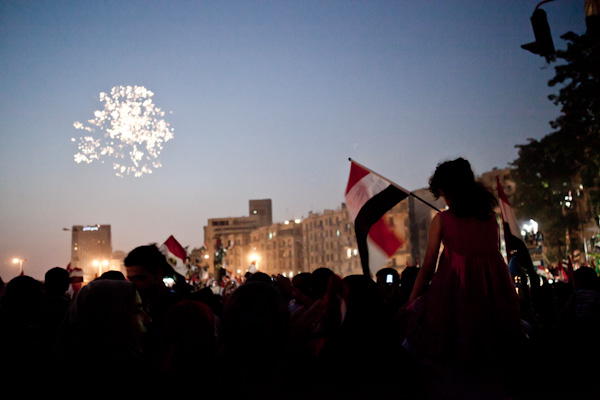
Sunday was a day of tears, jubilation, and reverie at the Mohamed Morsy campaign headquarters in Downtown Cairo. After the head of the Presidential Election Committee, Farouk Sultan, gave an agonizingly long speech before finally announcing that the Muslim Brotherhood’s candidate, Morsy, would be Egypt’s new President, he not only brought relief by ending his protracted introduction, but also ended the wait of the many Brothers waiting to see one of their own hold the country’s highest office.
“I never thought it was possible. There was no indication that anything like this could happen over the past 80 years,” said Mohamed al-Tameemy, who has been a member of the group for three decades. Tameemy, like many others, broke into tears while others stormed the podium before the campaign’s first press conference after the official announcement could begin.
Many of those present believe that Morsy’s triumph is an indication of an ultimate victory for the revolution. “We should not be the only one’s celebrating, all of Egypt should,” said Ahmed Amer, also a long-time Brotherhood member. “I am happy that this is the first time in Egypt’s history, over thousands of years, that it chose its leader, and it’s a good man,” said Ali Darrag, a physician with the Muslim Brotherhood for more than 20 years.
It was a long time before campaign spokesperson Ahmed Abdelaty able to quiet down the audience enough to give the campaign’s statement. “We will not rest easy until all of the revolution’s goals are met,” he said.
Abdelaty confirmed that effective immediately, Morsy would step down as the head of the Brotherhood’s Freedom and Justice Party, “so he could be at the same distance from all political groups.”
Morsy has yet to choose a running mate, but according to Abdelaty, he will be chosen in an inclusive and patriotic manner. Between campaign news and an announcement that Morsy would be addressing the nation for the first time as president-elect on Sunday evening, Brotherhood members and attendees chanted revolutionary chants such as, “Free revolutionaries … We will continue the [revolutionary] path.”
Despite competitive and sometimes ugly campaigning between Morsy and former Prime Minister Ahmed Shafiq, Morsy’s campaign stressed the importance of all Egyptians in the coming period.
The campaigners, however, did not back down from their view of a theoretical Shafiq win as counter-revolutionary one. “We thank the Egyptian people for insisting on not bringing back a regime that the people removed for,” said Yasser Ali, the campaign’s official spokesperson. Ali stressed that “getting rid of all forms of discrimination” would be one of the Morsy campaign’s goals.
In the midst of all the celebrations, Ali was asked how Morsy’s relationship with the ruling Supreme Council of the Armed Forces would be after a tumultuous on-again off-again love affair between them and the Brotherhood over the past year and a half. “We thank [SCAF] for what good they have done, but we insist that they made many contentious decisions that we disagree with,” Ali said.
While he did not mention what Morsy would do with the supplementary Constitutional Declaration clauses that severely limit his powers, many Brotherhood members present believed that the newly amended clauses are not something Morsy will accept. “No one in the Brotherhood accepts these amendments,” said Darrag. “Our position has not changed in this regard.”
Ali thanked many revolutionary groups and acknowledged their role in Morsy’s victory, including the April 6 Youth Movement, the Revolutionary Socialists and other political parties, as well as former presidential candidates, Abdel Moneim Abouel Fotouh, Mohamed Selim al-Awa, and Khaled Ali.




